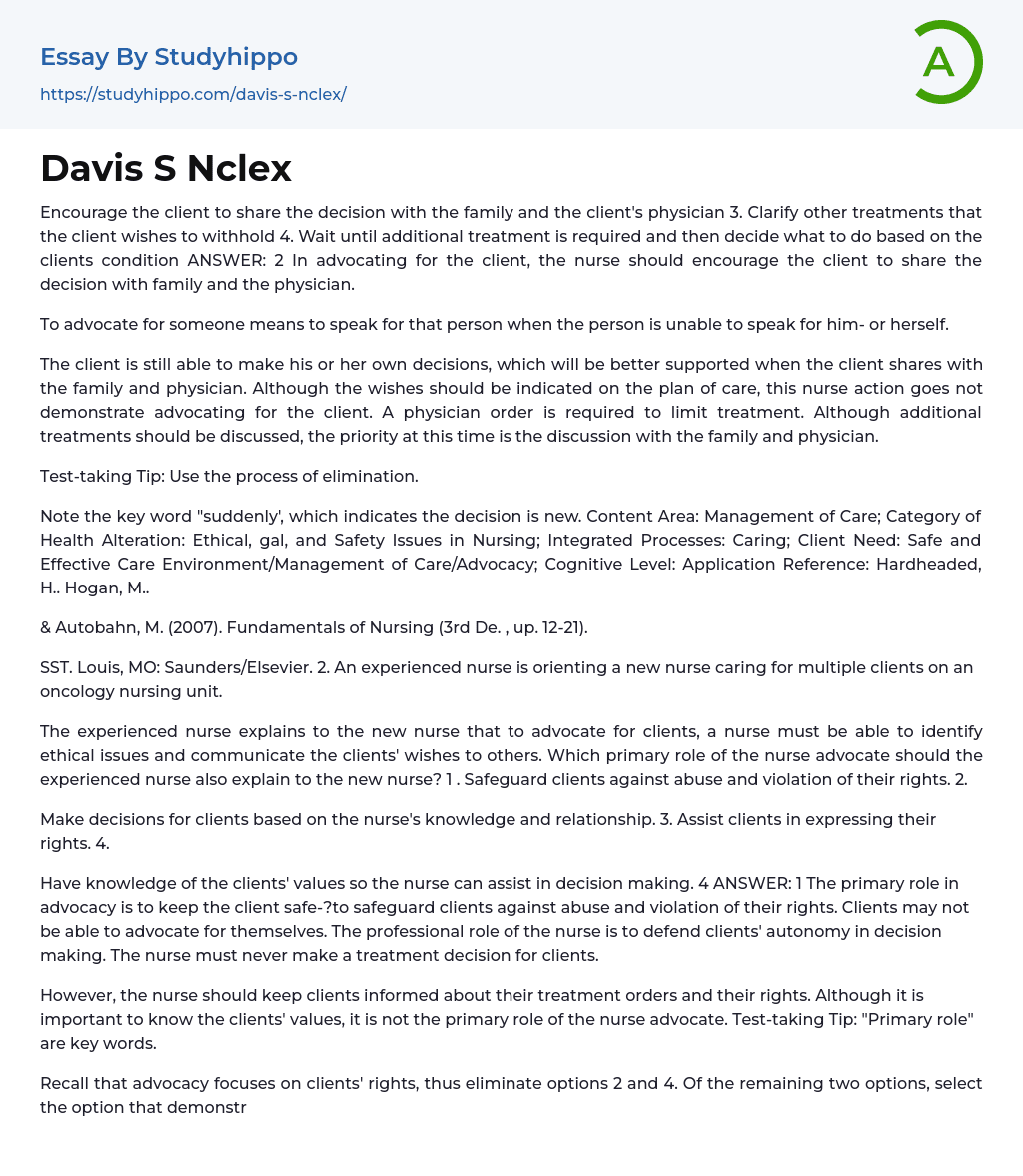To advocate for the client, the nurse should encourage the client to share the decision with family and the physician. It is important for the client to make their own decisions and involving their family and physician can provide better support. While the decision should be indicated on the plan of care, this action alone is not advocacy. To limit treatment, a physician order is required and any additional treatments should be discussed with all parties involved. The priority at this time should be on discussing with the family and physician. The sudden change in decision indicates a need for ethical, legal, and safety issues to be considered by the nurse. To provide safe and effective care environment as well as management of care and advocacy, it is important for the nurse to apply caring integrated processes. Reference: Hardheaded, H.
..., Hogan, M., & Autobahn, M. (2007). Fundamentals of Nursing (3rd De., up.12-21). SST. Louis, MO: Saunders/Elsevier.During the orientation of a new nurse on an oncology nursing unit, an experienced nurse emphasized that to advocate effectively for clients, a nurse must be able to identify ethical issues and communicate the clients' wishes to others. The experienced nurse also explained that the primary role of the nurse advocate is to safeguard clients against abuse and violation of their rights. This involves defending clients' autonomy in decision-making without making decisions on their behalf. The nurse should keep clients informed about their treatment orders and their rights. Although it is important for nurses to understand clients' values, it does not take priority over safeguarding their rights. When taking a test, it is important to pay attention to
keywords such as "primary role" and eliminate options that do not demonstrate a strong nursing role in advocacy which focuses on clients' rights.Chapter 5 of Wilkinson and Van Eleven's (2007) Fundamentals of Nursing discusses legal and safety issues in nursing, emphasizing the safe and effective care environment through management of care and advocacy. One example scenario involves a post-surgical client reporting significant pain to the nurse, who notes that the highest possible dose of hydrocarbon plus acetaminophen has already been administered regularly. The nurse offers the client two Eviction tablets, but the client expresses confusion at receiving a different medication than before. The nurse must now decide whether to call the pharmacy and ask for the original medication or take another course of action.
- Interview essays
- Job Interview essays
- Career Choice essays
- Career Goals essays
- Portfolio essays
- Community Service essays
- Work-Life Balance essays
- Performance Appraisal essays
- Job essays
- Employee essays
- Skills essays
- Service essays
- Vocation essays
- Internship essays
- Work Experience essays
- Duty essays
- Dream Job essays
- Career Plan essays
- Hospital essays
- Physician essays
- Health Care Provider essays
- Universal Health Care essays
- Readmission essays
- Psychometrics essays
- Measure essays
- Why I Want to Be a Nurse essays
- Nursing Profession essays
- Why Did You Choose Nursing essays
- Career essays
- Career Path essays
- Homeless essays
- Labour Economics essays
- Occupational Safety And Health essays
- Pension essays
- Profession essays
- Salary essays
- Strike Action essays
- Wage essays
- Working Together essays
- Workplace essays
- Ambition essays
- Anger essays
- Betrayal essays
- Boredom essays
- Confidence essays
- Courage essays
- Desire essays
- Disgrace essays
- Doubt essays
- Empathy essays




